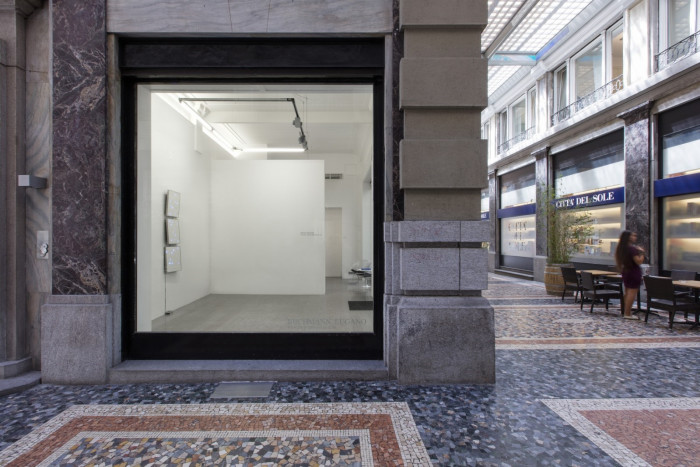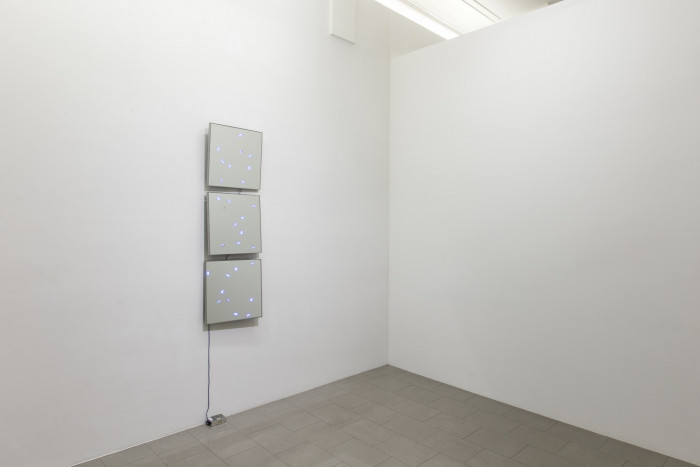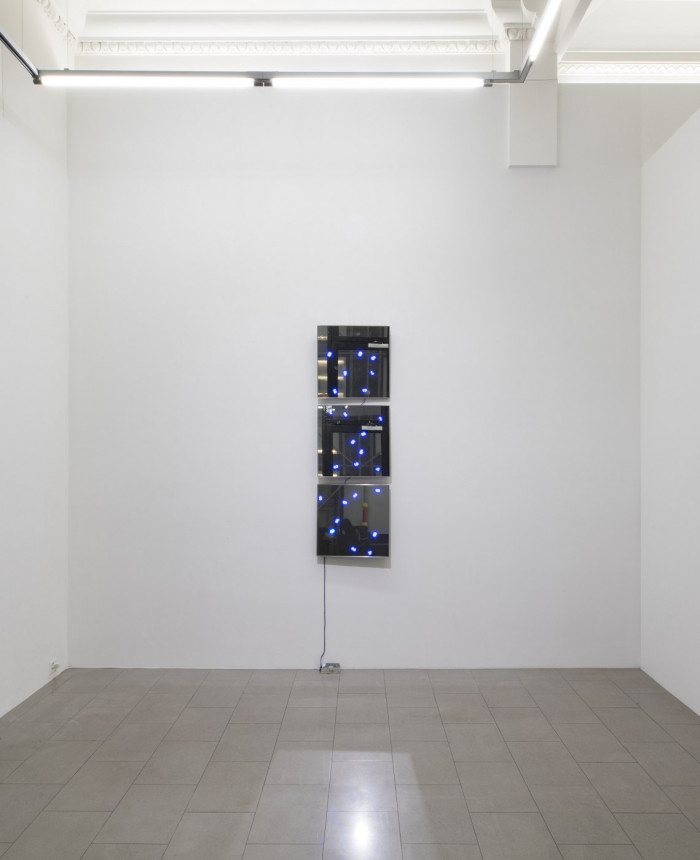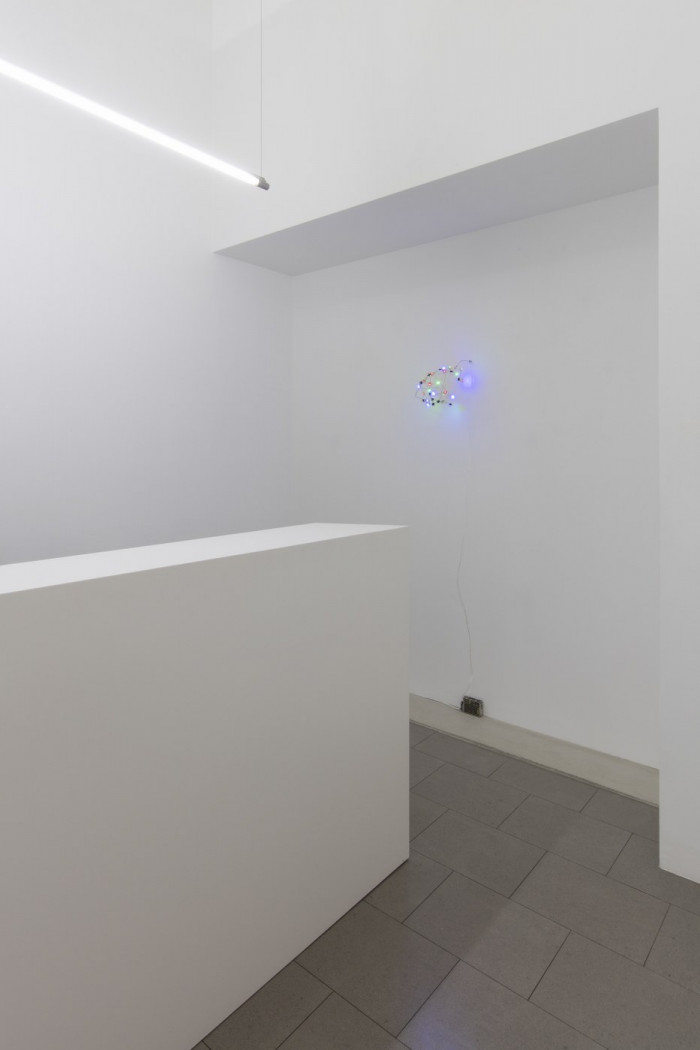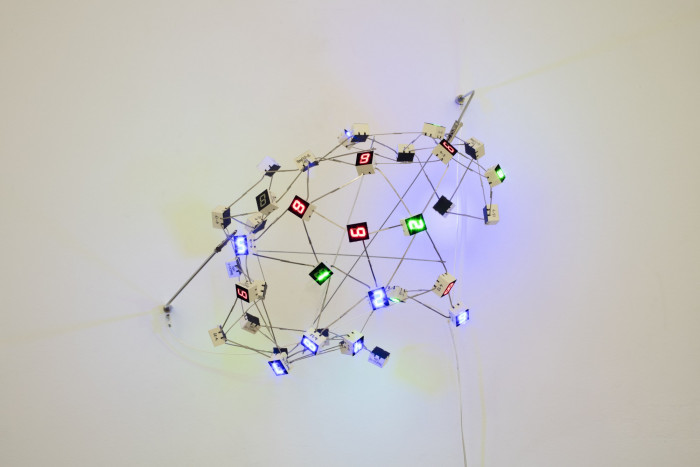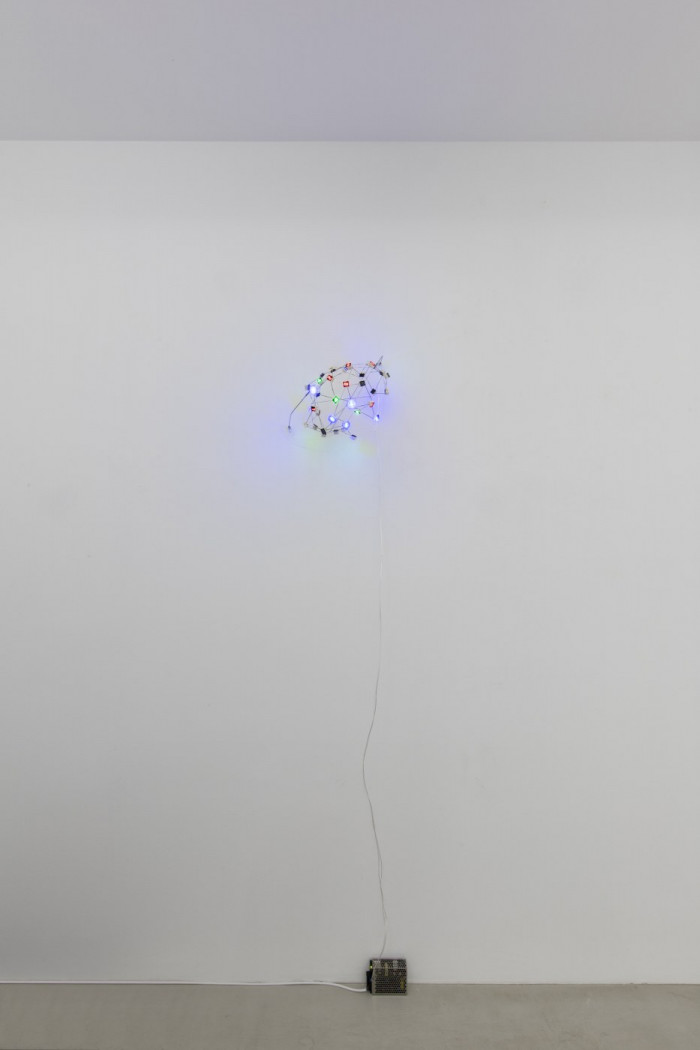Tatsuo Miyajima "C.T.C.S. Flower Dance" no. 12
On Friday, 2 June 2017 at 5.00 pm, the Buchmann Lugano city space presents a new artwork “C.T.C.S. Flower Dance” no. 12 by the Japanese artist Tatsuo Miyajima (Tokyo, *1957).
In the exhibited artwork coloured LED numeric displays have been mounted in 3 square-shaped reflective panels. Several of these panels go to make up a work and are each fixed to the wall at slightly different angles so as to reflect the surrounding space and thus creating an interrelationship between time and space.
Controlled by a complex algorithm, which despite its apparent randomness is in fact subject to a precise logic – the numbers 1-9 light up in a hypnotic rhythm. Inspired by Japanese cherry blossoms (sakura), the individual LEDs are arranged to resemble falling flowers on the reflecting surfaces. A poetic excursion on space and time takes shape in the interplay between the surroundings and each of the reflecting units.
‘Keep Changing’, ‘Connected with everything’ and ‘Continue forever’ are three parameters, with which Tatsuo Miyajima epitomizes his multifaceted oeuvre. The artist’s work harnesses technology together with fundamental existential considerations and at least since the presentation of his work Mega Death in the Japanese pavilion at the Biennale in Venice in 1999 has achieved international standing.
‘New technologies and old traditions coexisted naturally within my everyday life’ the artist says explaining the foundation of his three-pronged approach using oriental philosophy, technology and contemporary theory. This also is the way Myajima’s three axioms relate to his analysis of the theoretical writings of Deleuze and Guattari. For the contemporary formation of knowledge for such important thinkers this propagated heterogeneity and change as a means of the acquisition of awareness. The cyclical nature of Tatsuo Myajima’s oeuvre, the continuous change which forms the basis of his works is an invitation to a meditative contemplation on the impermanence of all being and the ‘dependent causality’ of space and time.
The Museum of Contemporary Art Australia in Sydney has recently hosted a comprehensive retrospective of the artist.
His works are to be found in important public collections such as Kunstmuseum Bern, Kunstmuseum St. Gallen, Université de Genève, Tate Gallery, London, Staatsgalerie Moderner Kunst, Münich, San Francisco Museum of Modern Art, Museum of Contemporary Art, Chicago, Australian Museum, Sydney, Museum of Contemporary Art, Tokyo, National Gallery of Canada, Ottawa.
For more information:
Buchmann Lugano
Via della Posta no. 2, CH-6900 Lugano
From 2 June
Tuesdays to Fridays 1.00 pm – 6.00 pm
Saturdays 1.00 pm – 5.00 pm
Lo spazio cittadino Buchmann Lugano presenta a partire da venerdì 2 giugno dalle ore 17.00 la nuova opera “C.T.C.S. Flower Dance” no. 12 dell’artista giapponese Tatsuo Miyajima (Tokyo, *1957).
L’opera esposta è composta da 3 pannelli specchianti a parete, di forma quadrangolare, all'interno dei quali sono inseriti dei display numerici a LED colorati. Ogni pannello è fissato al muro secondo angolazioni leggermente diverse, in modo da riflettere l'ambiente circostante, con l'intento di determinare un'interrelazione tra spazio e tempo.
Scanditi secondo un complesso algoritmo, che a dispetto dell'apparente casualità segue la sua logica ben precisa, i numeri da 1 a 9 si illuminano a ritmo ipnotico. Ispirandosi alla celebrata fioritura dei ciliegi in Giappone (sakura), ogni numero luminoso è concepito per evocare un fiore che cade sulle superfici a specchio. Prende così forma un'escursione poetica sullo spazio e il tempo, nell'interazione tra ambiente ed elementi riflettenti.
Keep Changing, Connected with everything e Continue forever sono le tre linee guida con cui Tatsuo Miyajima sintetizza la sua opera poliedrica. Nel suo processo creativo l'artista utilizza il mezzo tecnologico per indagare le grandi questioni esistenziali, ed è riuscito a imporsi sulla scena internazionale fin dalla presentazione della sua opera Mega Death, alla Biennale di Venezia del 1999, nel padiglione del Giappone.
“Le nuove tecnologie e le vecchie tradizioni coesistono naturalmente da sempre nella mia vita di ogni giorno”, afferma l'artista spiegando i fondamenti del suo triplice approccio, vale a dire la filosofia orientale, la tecnologia e la teoria contemporanea. E questo è anche il modo in cui i tre assiomi di Miyajima si ricollegano alla sua analisi degli scritti teoretici di Deleuze e Guattari. Per questi illustri pensatori l'eterogeneità diffusa e il cambiamento sono strumenti per l'acquisizione di una maggiore consapevolezza, condizione necessaria alla formazione contemporanea della conoscenza. La natura ciclica dell'opera di Tatsuo Miyajima, e il continuo cambiamento che sta alla base dei suoi lavori, è un invito alla meditazione e alla contemplazione dell'impermanenza di tutte le cose e della “causalità dipendente” di spazio e tempo.
Il Museum of Contemporary Art Australia di Sydney ha recentemente ospitato una retrospettiva dell'opera dell'artista.
Sue opere sono presenti nelle collezioni di importanti musei e spazi pubblici, tra cui: Kunstmuseum Bern, Kunstmuseum St. Gallen, Université de Genève, Tate Gallery, Londra, Staatsgalerie Moderner Kunst, Monaco, San Francisco Museum of Modern Art, Museum of Contemporary Art, Chicago, Australian Museum, Sydney, Museum of Contemporary Art, Tokyo, National Gallery of Canada, Ottawa.
Per maggiori informazioni:
Buchmann Lugano
Via della Posta 2, CH-6900 Lugano
Dal 2 giugno
Da martedì a venerdì 13.00 – 18.00
Sabato 13.00 – 17.00
Tatsuo Miyajima
Born 1957 in Tokyo. Lives and works in Ibaraki, Japan.
2012 - 2016 Kyoto University of Art & Design Vice President
2006 - 2016 Tohoku University of Art & Design Vice President
| 1986 | Completed postgraduate studies at Tokyo National University of Fine Arts and Music (M.A.) |
| 1984 | Graduated from Oil Painting Course, Fine Arts Department, Tokyo National University of Fine Arts and Music (B.A.) |
| 1998 | London Institute honorary doctorate |
| 1993 | Fondation Cartier pour l'art contemporain, Paris |
| 1990–1991 | DAAD Scholarship Berliner Kunstprogramm Berlin, |
| 1990 | ACC - Asian Cultural Council, New York |
National Museum of Modern Art, Kyoto, Japan
Hara Museum of Contemporary Art, Tokyo, Japan
Museum of Modern Art, Shiga, Japan
Nagoya City Art Museum, Nagoya, Japan
Museum of Contemporary Art, Tokyo, Japan
Panasonic Museum in Osaka, Japan
FARET Tachikawa, Tokyo, Japan
TV Asahi building, Tokyo, Japan
Tokyo Opera City, Tokyo, Japan
Chiba City Museum, Chiba, Japan
Group Home Sala in Florence Village, Akita, Japan
The Museum of Modern Art, Saitama, Japan
Contemporary Art Museum, Kumamoto, Japan
Toyota Municipal Museum of Art, Aichi, Japan
Saitama Prefectural University, Saitama, Japan
Izumi City Plaza, Osaka, Japan
Naoshima Contemporary Art Museum, Kagawa, Japan
Iwaki City Art Museum, Fukushima, Japan
Hiroshima City Museum of Contemporary Art, Hiroshima, Japan
M+ Museum, Hong Kong
Taipei Fine Arts Museum, Taiwan
Samsung Cultural Foundation, Seoul, Korea
Leeum, Samsung Museum, Seoul, Korea
Chinese Telecom, Taipei, China
Tate Gallery, London, UK
The British Museum, London, UK
Deste Foundation for Contemporary Art, Athens, Greece
Fondation Cartier pour l'art contemporain, Paris, France
Kunstmuseum Bern, Bern, Switzerland
Kunstmuseum St. Gallen, Switzerland
Université de Genève, Switzerland
La Caixa, Barcelona, Spain
Pinakothek der Moderne, Munich, Germany
Kunstmuseum Stuttgart, Germany
Fondazione TESECO per l'Arte, Pisa, Italy
Chateau La Coste, Aix-en-Provence, France
Modern Art Museum of Fort Worth, Texas, U.S.A.
San Francisco Museum of Modern Art, San Francisco, U.S.A.
Museum of Contemporary Art, Chicago, U.S.A.
Dallas Museum of Art, U.S.A.
Denver Art Museum, Denver, U.S.A.
Dannheisser Foundation, New York, U.S.A.
National Gallery of Canada, Ottawa, Canada
Oakville Galleries, Oakville, Canada
Australian Museum, Sydney, Australia
| 2005 | ARTISTS SUMMIT, KYOTO, Kyoto University of Art and Design, Kyoto, Japan |
| 2002 | Collaboration with SOPHNET (fashion design brand) 2002 A/W Collection Tokyo 1000 Real Life Project - Death Clock, Tokyo |
| 2000 | Floating Time - Hospice Project, Sotoasahikawa Hospital, Akita |
| 1998 | Portfolio for The Edge of Awareness |
| 1995 | Portfolio for 4. Uluslararasi Istanbul Bienali-ORIENT / ATION |
| 1994 | Mirror, multiple, Spiral, Tokyo |
| 1993 | Over Economy, acrylic, pencil on bank note \10,000 |
| 1992 | Project for PARKETT |
| 1984 | Time Funeral, record jacket, SMS Records |


